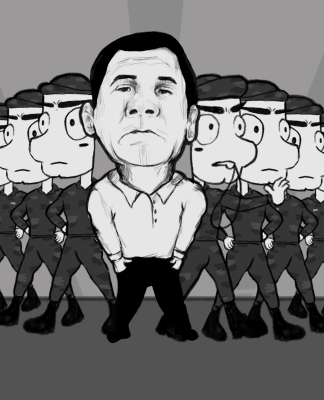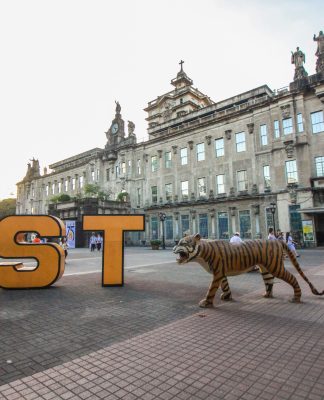ONLY mediocre writers should be worried about the rise of artificial intelligence (AI), veteran anchor Ed Lingao said, as chatbots like ChatGPT produce just ordinary sentences.
Even if chatbots learn the strict rules of grammar and syntax and process data faster, they cannot replicate the kind of reportage expected of journalists, the TV5 newsman told participants of the Varsitarian’s 25th Inkblots, the annual fellowship between campus journalists and journalism practitioners.
“Hindi siya magaling magsulat; magaling siya magsulat ng ordinaryo,” Lingao said in his keynote address on Thursday, Jan. 11. “You’re good in being mediocre, that’s what ChatGPT is. That should be comforting.”
Chatbots, a form of generative AI, get their information by feeding their language models with data scraped from various sources, including websites, social media posts, and algorithms.
This process has worried news publishers because it not only siphons readers but also violates copyright laws.
In an analysis titled “White Paper: How the pervasive copying of expressive works to train and fuel generative artificial intelligence systems is copyright infringement and not a fair use,” the News Media Alliance, a group of over 2,000 publishers in the United States, claimed that generative AI was unfairly reaping benefits from content laboriously created by publishers.
“Generative AI systems, while holding promise for consumers, businesses and society at large, are commercial products that have been built – and are run – on the backs of creative contributors,” it stated in its October 2023 report. “These systems have been developed by copying massive amounts of the creative output of the Alliance’s members, almost always without authorization or compensation.”
“The incipient and predictable consequence of Generative AI’s substitutive uses will be to damage the news and digital media industry. And it is not just copyright owners but society that will lose if Generative AI is allowed to so harm the journalism industry,” it added.
One of the Alliance’s members, The New York Times, filed a lawsuit on Dec. 27, 2023, against OpenAI, the company behind ChatGPT, and Microsoft, owner of the recently rebranded chatbot Copilot, for copying millions of articles.
In a blog post on Jan. 8, OpenAI claimed that the lawsuit has “no merit” and reaffirmed its commitment to collaborate with the news media.
“Our goals are to support a healthy news ecosystem, be a good partner, and create mutually beneficial opportunities,” the company said. “We look forward to continued collaboration with news organizations, helping elevate their ability to produce quality journalism by realizing the transformative potential of AI.”
Keeping up with AI
The advent of chatbots has raised the question of whether AI will eventually replace journalists, as some editors had conceded that “machines were writing better than many humans,” Lingao said.
“ChatGPT and other bots are now writing better than us, and that is a point of major concern because ChatGPT is not an excellent writer,” he said. “That should be shaking us to the core [dahil] hindi na nga magaling ang AI, naiisahan pa tayo.”
“‘Yong judgment day natin, hindi pala nuclear war. Ang judgment day ng mga reporter ay bad writing. Mas magaling pa ang mediocre AI sa atin,” he added.
Lingao urged campus journalists to level up their game.
“It goes back to you guys in the field,” the veteran anchor said. “Reporting is not just about writing. Reporting starts with number one, research, and number two, talking to sources.”
“Lumabas kayo. Galingan niyo. Mangulit kayo. Mangalampag kayo kasi ‘di magagawa ng ChatGPT ‘yon. ‘Di magagawa ng ChatGPT na maglagay ng libog,” he added.


















